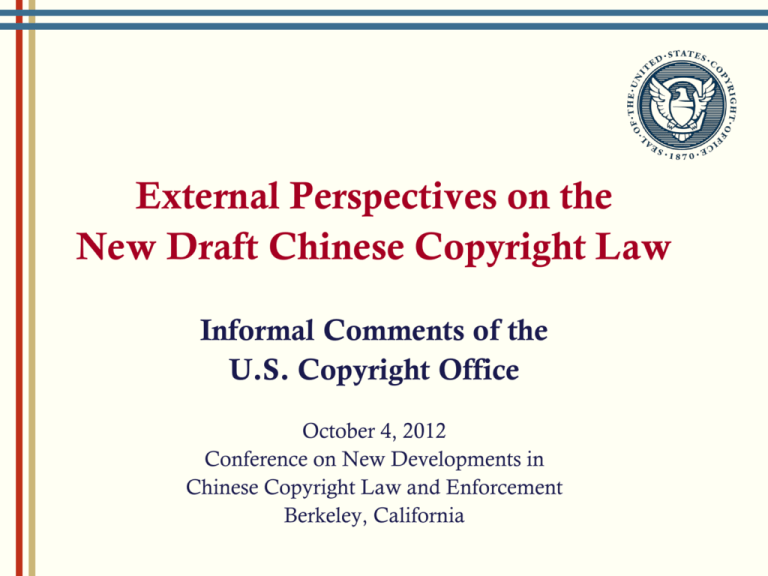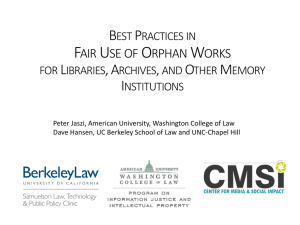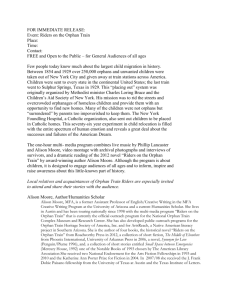Orphan Works - Berkeley Law
advertisement

External Perspectives on the New Draft Chinese Copyright Law Informal Comments of the U.S. Copyright Office October 4, 2012 Conference on New Developments in Chinese Copyright Law and Enforcement Berkeley, California Example of the Range of Issues in the New Draft Chinese Copyright Law Definition of Computer Programs ISP Liability Presumptions Live Sports Programming Audiovisual Performance Rights Collective Management Rights for Producers of Sound Recordings Orphan Works Exceptions and Limitations Works of Applied Art Technological Protection Measures (TPMs) Administrative Enforcement Mechanisms Damages Mediation Measures Points of Attachment Resale Royalty Reproduction Right Use of Unlicensed Software Provisions affecting Contracts Three-Step Test Informal Observations on A Few Select Issues ― Transparency ― Orphan works ― Live sports programming ― Temporary copies and the reproduction right ― Resale royalty Transparency • Copyright Law Reform – First Draft – Second Draft • Ongoing work by the Supreme People’s Court regarding its draft judicial interpretation, “Provisions of Several Issues of Application of Laws in the Trial of Civil Disputes in Relation to Infringement of the Right of Communication through Information Networks” Orphan Works • Challenges that publishers, film makers, museums, libraries, universities, and private citizens, among others, have had in managing risk and liability when a copyright owner cannot be identified or located • Use without permission implicates exclusive rights • Uncertainty about consequences of use Examples of Orphan Works Orphan works span all types of artistic genres • Ownership investigations may be fruitless: Book published in the United States in 1980 by a defunct publishing company and authored by a person with a common name (like John Smith) Painting with no signature, date, or place of origin Video footage of an inaugural ball shot by someone who died four years ago with no will and no known heirs When are orphans an issue? • © ownership not apparent from work (e.g., unsigned photos or drawings) • Deceased © owner / unclear ownership chain • Contractual provisions muddy the waters • © owner is known but cannot be found • Does not include © owners who refuse to grant rights or request high fees Orphan Works in China Articles 25-26 of the Second Draft • Applies to works in magazines and newspapers that are transferred into a digital copy or other users make a digital copy or transfer it across information networks to the public • After user’s efforts to identify a copyright owner are in vain and when other requirements are met, users can exploit the works after applying to the copyright administration authority under the State Council and pay royalty through escrow arrangement • Specific rules on orphan works will be separately established by the State Council Orphan Works in China Issues/clarifications going forward in the law • What about the situation where current rights holders are unknown (e.g. heirs, assignees, publishers out-of-business) • What about situations where rightsholders are known but cannot be located (compared to where identities are “unclear”) • Who is the “owner of the original copy” Issues for the Implementing Regulations • What will be considered a thorough search • How will the “use fee” be determined • How will fees be distributed and to whom Orphan Works Elsewhere • Other countries with orphan works legislation already in-force, for example: Canada, Denmark, France, Hungary, India, Japan, South Korea • New EU Directive on Orphan Works (2012) • Reviews about potential orphan works solutions are ongoing: Australia, Germany, United Kingdom … Orphan Works in the U.S. • 2006 Orphan Works Report by USCO • Legislation proposed in 2006 and 2008 • Key elements – Diligent search – Limited remedies – Pay reasonable compensation if owner emerges, or face full liability • 2011 Legal Aspects of Mass Digitization by USCO • March 2011 District Court decision rejecting the proposed Google Book settlement noted that the settlement would have encroached upon Congress's ability to set copyright policy with respect to orphan works. Orphan Works and the U.S. Copyright Office Orphan Works is one of the priorities identified by the Register of Copyrights Maria Pallante in her October 2011 “Priorities and Special Projects” document. www.copyright.gov Live Sports Programming • Type of Protection – Copyright – Neighboring Rights for broadcasters • Originality • Fixation • Current Chinese Copyright Law Live Sports Programming • “Audiovisual Work” definition in Second Draft • “Live Broadcast” was only in the First Draft with definition of the right of dissemination via an information network • Notes to Second Draft: “Live broadcast” removed to limit the definition of broadcasting to non-interactive communications • Further clarity important Temporary Copies • Critical in the digital environment • The reproduction right should be better defined to clarify that the reproduction right covers temporary digital copies • “In any manner or form” Resale Royalty (Droit de Suite) Article 12 of the Second Draft • Works of art and photography, scripts of literary works and music works • Authors, heirs and legatees have the (inalienable) right of sharing the profit obtained through the auction of such originals • Reciprocity for foreigners whose home countries provide same rights to Chinese authors • Further rules to be established by the State Council Resale Royalty and the U.S. Copyright Office • More than 60 countries have a resale royalty • USCO has issued a public Notice of Inquiry, asking questions on how copyright law affects and supports visual artists and how a federal resale royalty right might affect current and future practices for those groups or individuals involved in creation, licensing, sale, exhibition, dissemination and preservation of works of visual art • Comments are due November 5, 2012 Back to the Many Issues in the New Chinese Draft Copyright Law Definition of Computer Programs ISP Liability Presumptions Live Sports Programming Audiovisual Performance Rights Collective Management Rights for Producers of Sound Recordings Orphan Works Exceptions and Limitations Works of Applied Art Technological Protection Measures (TPMs) Administrative Enforcement Mechanisms Damages Mediation Measures Points of Attachment Resale Royalty Reproduction Right Use of Unlicensed Software Provisions affecting Contracts Three-Step Test Xie Xie * Thank You Maria Strong Senior Counsel for Policy & International Affairs United States Copyright Office Washington, D.C. www.copyright.gov




